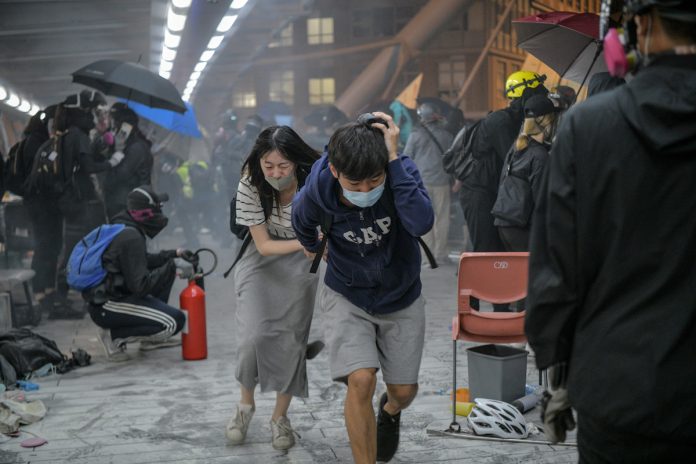The U.S. Senate unanimously passed legislation on Nov. 19 aimed at protecting human rights in Hong Kong amid a crackdown on a pro-democracy protest movement.
Following the voice vote, the “Hong Kong Human Rights and Democracy Act” will go to the House of Representatives, which approved its own version last month. The two chambers will have to work out their differences before any legislation can be sent to President Donald Trump for his consideration.
“The people of Hong Kong see what’s coming — they see the steady effort to erode the autonomy and their freedoms,” Republican Senator Marco Rubio said at the start of the brief Senate debate, accusing Beijing of being behind the “violence and repression” in the Asian financial hub.
The Senate passed a second bill, also unanimously, that would ban the export of certain crowd-control munitions to Hong Kong police forces. It bans the export of items such as tear gas, pepper spray, rubber bullets and stun guns.
Under the first Senate bill, U.S. Secretary of State Mike Pompeo would have to certify at least once a year that Hong Kong retains enough autonomy to qualify for special U.S. trading consideration that bolsters its status as a world financial center. It also would provide for sanctions against officials responsible for human rights violations in Hong Kong.
There was no immediate response from the White House, which has yet to say whether Trump would approve the Hong Kong Human Rights bill. A U.S. official said recently that no decision had been made, but the unanimous Senate vote could make a veto more difficult for the Republican president.

In Beijing on Nov. 20, the communist government condemned the passage of the Hong Kong Human Rights and Democracy Act.
Jackie Hung, a project officer with the Justice and Peace Commission of the Hong Kong Diocese, told LICAS News that the bill can help improve the deteriorating human rights situation in the city.
“It’s very important to bring the agenda to the international level, and we hope it can alert other countries about how Chinese government treats Hong Kong people — they don’t respect the promise of the one country, two systems,” Hung said.
She said the Hong Kong government — through the brutal behavior of the police — are destroying the city’s younger generation.
Hung said she hoped that the bill would restrain police and remind them that the world’s media is watching.
Following passage of the bill, Senate Democratic Leader Chuck Schumer said, “We have sent a message to President Xi (Jinping): Your suppression of freedom, whether in Hong Kong, in northwest China or in anywhere else, will not stand.
“You cannot be a great leader — and you cannot be a great country — when you oppose freedom, when you are so brutal to the people of Hong Kong, young and old, who are protesting.”
Xinjiang, in northwest China, is home to many mostly Muslim Uyghurs, large numbers of whom have been detained in what some U.S. officials have called “concentration camps.”

Four-day siege
News on the bill comes as a four-day siege of Hong Kong’s Polytechnic University draws to an end. The campus has seen battles between police and protestors.
The BBC’s Chinese correspondent, Stephen McDonell said on Nov. 20 that dozens of student protestors were still holding out inside despite provisions running low. Around 800 to 900 protesters have already left the campus.
A petition seeking Pope Francis’ intervention to resolve the confrontation between the police and young protestors at the university was sent to the Vatican on Nov. 18.
Demonstrators in Hong Kong have been protesting in the streets amid increasing violence and fears that Beijing will ratchet up its response to stop the civil disobedience.
Students and young people have been at the forefront of the protests that started in June as a backlash against a now-scrapped piece of legislation which would have allowed criminal defendants to be transferred from Hong Kong’s independent legal system to mainland China. But anger over economic inequality in the territory, concern over perceived dissipating freedoms and shock over police use of force have mounted.
With Reuters









